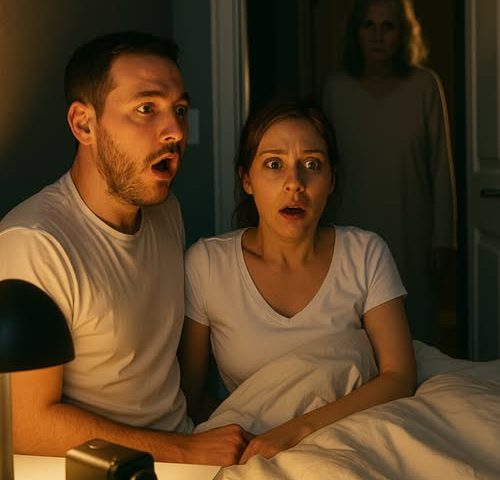Liam and I had been married a little over a year. Our life in our quiet Boston home was peaceful — except for one deeply unnerving detail: his mother, Margaret.
Every single night at exactly 3 a.m., she knocked on our bedroom door.
Not loud — just three slow, deliberate knocks.
Knock. Knock. Knock.
Enough to jolt me awake every time.
At first, I thought she needed help or was disoriented. But each time I opened the door, the hallway stood empty — dim, silent, still.
Liam brushed it off. “Mom never sleeps well,” he told me. “She wanders sometimes.”
But the more it happened, the more my nerves frayed.
After nearly a month, I needed answers. I bought a tiny camera and set it above the bedroom door. I didn’t tell Liam — he would’ve insisted I was being dramatic.
That night, the knocks came again.
Three soft taps.
I kept my eyes closed, pretending to sleep while my heart pounded.
The next morning, I watched the footage.
What I saw chilled me to the bone.
Margaret stepped out of her room in a long white nightgown and walked slowly down the hallway. She paused directly outside our door, glanced around like she wanted to be sure no one was watching, and tapped three times. Then she simply… stood there.
For ten long minutes, she didn’t move. Her face blank. Her eyes hollow. Like she was listening for something — or someone. Then she turned and walked away.
I confronted Liam, trembling.
“You knew something was wrong, didn’t you?”
He hesitated. Then quietly said, “She doesn’t mean harm. She just… has her reasons.”
But he wouldn’t explain further.
I was done with unanswered questions. That afternoon, I approached Margaret myself.
She sat in the living room sipping tea. The TV murmured softly.
“I know you’ve been knocking at night,” I said. “We saw the video. I just want to know why.”
She placed her cup down with care. Her gaze locked onto mine — sharp, strange, unreadable.
“And what exactly do you think I’m doing?” she murmured, her voice low enough to crawl under my skin.
Then she stood and walked away.
That evening, I reviewed the rest of the footage. My hands shook.
After knocking, she pulled a small silver key from her pocket. She held it to the lock — not turning it, just pressing it there — before leaving.
The next morning, desperate, I searched Liam’s nightstand. Inside was a worn notebook. One page read:
“Mom still checks the doors every night. Says she hears something — but I don’t. She asked me not to worry. I think she’s hiding something.”
When Liam saw what I’d found, he broke down.
He told me that after his father died years ago, Margaret developed severe insomnia and anxiety. She became obsessed with locking doors, convinced someone was trying to get in.
“Lately,” Liam whispered, “she’s been saying things like… ‘I have to protect Liam from her.’”
A cold wave washed over me.
“From me?” I choked out.
He nodded, ashamed.
Fear settled deep in my stomach. What if one night, she tried to open the door?
I told Liam I couldn’t stay unless she got help. He agreed.
We took her to a psychiatrist in Cambridge a few days later. Margaret sat stiffly, hands folded, eyes downcast.
We explained everything — the knocking, the key, the staring.
The doctor asked gently, “Margaret, what do you believe is happening at night?”
Her voice quivered.
“I have to keep him safe,” she whispered. “He’ll come back. I can’t lose my son again.”
Later, the doctor told us the truth.
Thirty years ago, when Margaret lived in upstate New York with her husband, an intruder broke into their home. Her husband tried to confront him — and didn’t survive.
Ever since, she had lived in terror that the same danger would return.
When I entered Liam’s life, her trauma confused me with that old threat.
She didn’t hate me — her mind simply misread me as another stranger who could “take her son away.”
Guilt twisted in my chest.
I had seen her as frightening… but she was the one living in fear.
The doctor recommended therapy and mild medication, but said the most important things were patience and steady reassurance.
“Trauma doesn’t disappear,” he said. “But love can soften it.”
That night, Margaret approached me in tears.
“I never meant to scare you,” she whispered. “I only want to keep my son safe.”
For the first time, I reached for her hand.
“You don’t need to knock anymore,” I said softly. “No one is coming. We’re safe. All of us.”
She broke down, sobbing like a child finally understood.
The next weeks weren’t perfect. Some nights she still woke hearing footsteps. Some nights I lost patience. But Liam would remind me, “She’s not the enemy — she’s still recovering.”
So we created new routines.
Before bed, we checked each door together.
We installed a smart lock.
We shared tea instead of fear.
Margaret slowly opened up — about her past, her husband, even about me.
And little by little, the 3 a.m. knocks disappeared.
Her eyes grew warmer.
Her voice steadier.
Her laughter returned.
The doctor called it healing.
I called it peace.
And in the end, I learned something profound:
Helping someone heal doesn’t mean fixing them — it means walking with them through their shadows long enough to see the light come back.
